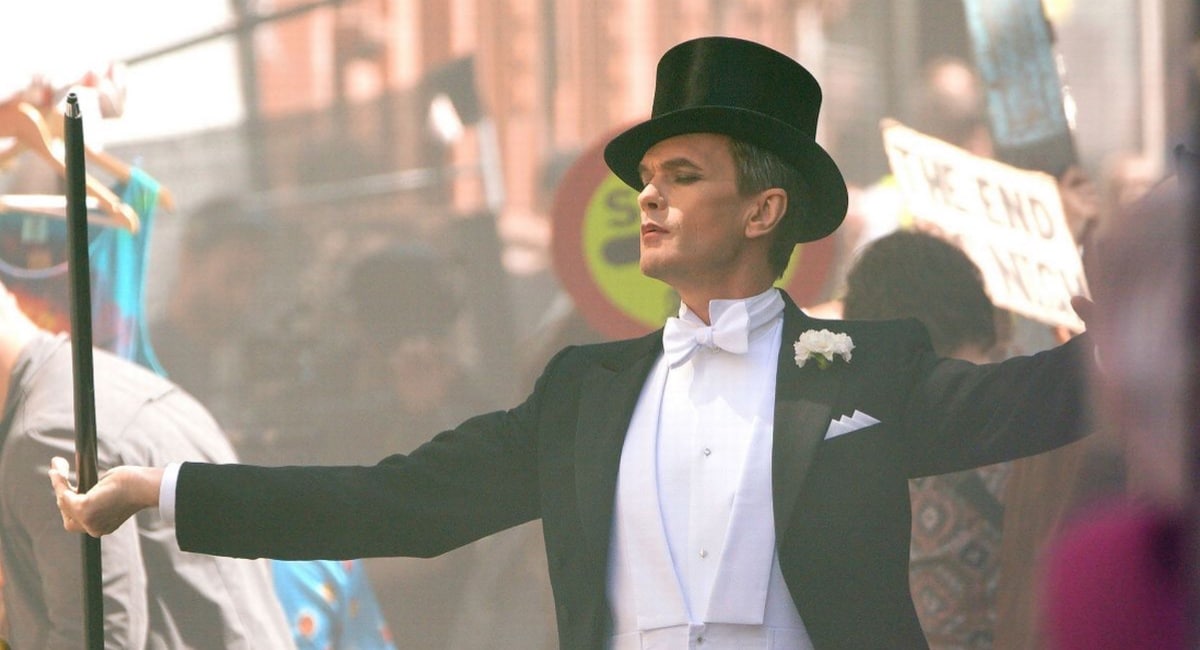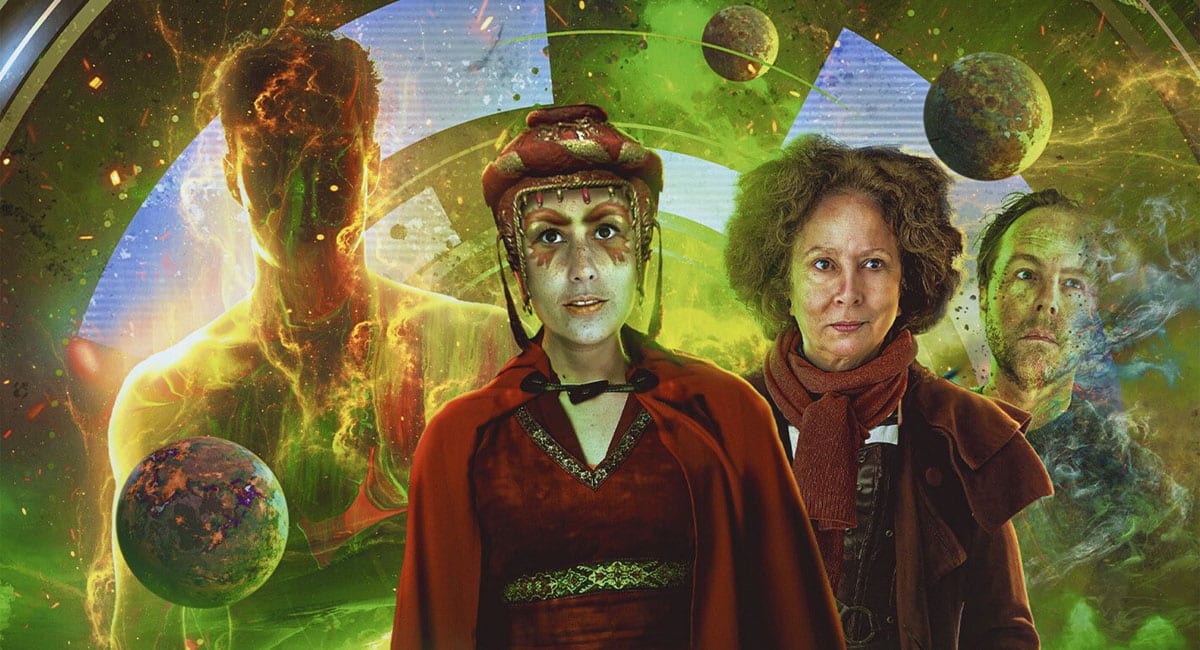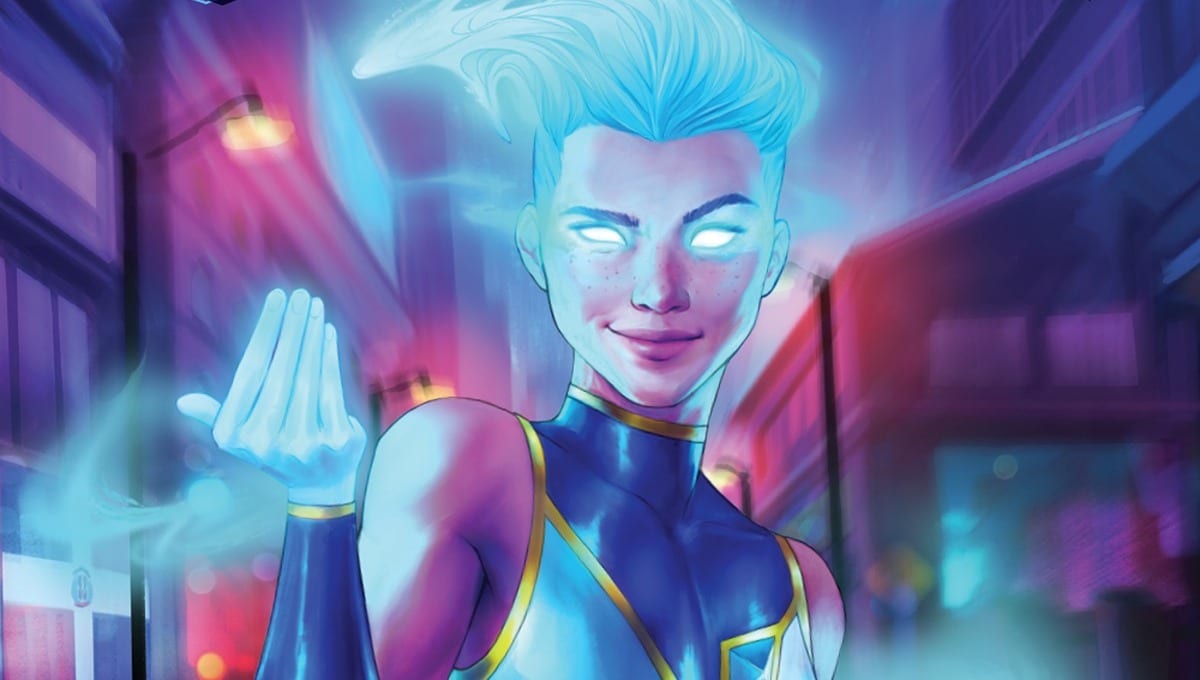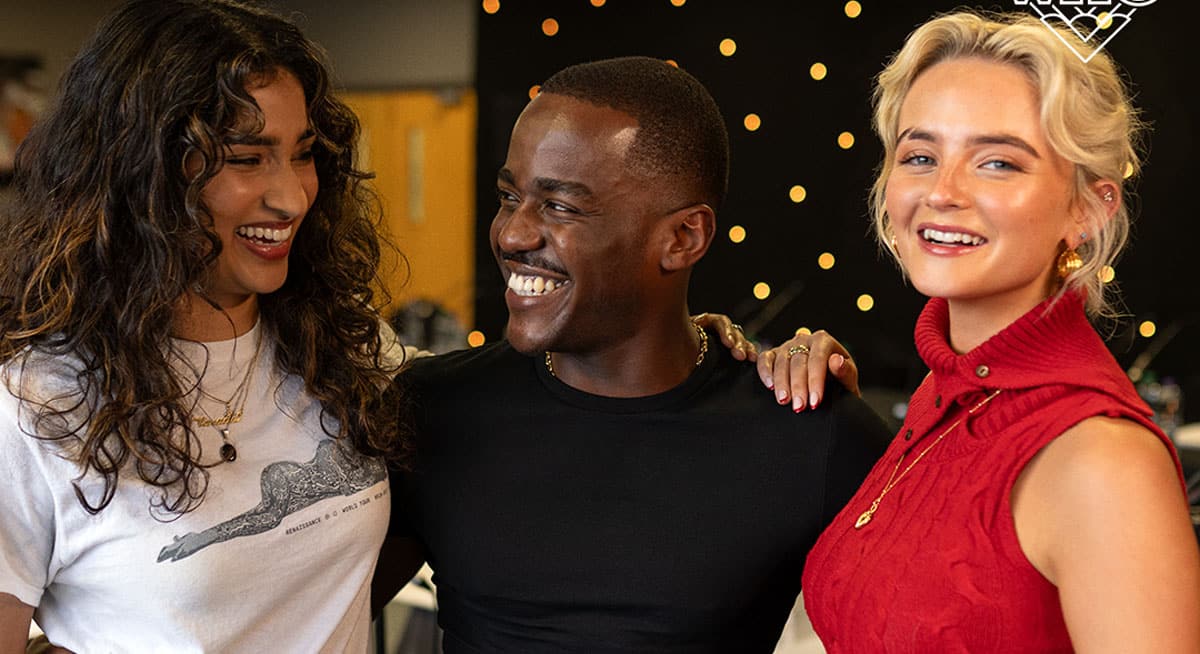This review contains SPOILERS for the Doctor Who episode, “The Giggle.”
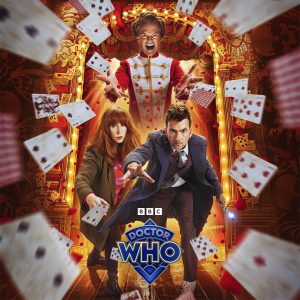
Doctor Who, “The Giggle”
Directed by Chanya Button
Written by Russell T. Davies
Starring David Tennant, Catherine Tate, Neil Patrick Harris, Jemma Redgrave, Bonnie Langford, Ruth Madeley, Karl Collins, Jacqueline King, Yasmin Finney, and Ncuti Gatwa
The 60th-anniversary episode seems to have irreversibly changed Doctor Who lore forever. While that happens quite often these days, it rarely seems to have a lasting impact on the IP. So, unlike the last time such an occurrence occurred, did this one stick the landing?
Recap/Review of “The Giggle”
The episode begins right where “Wild Blue Yonder” concluded, with the world suddenly in chaos as the Doctor and Donna return from their far-off trip. Unfortunately, comedian and actor Bernard Cribbins died after filming his scenes from the previous episode, so the character of Wilfred Mott (obviously a man dressed up to look like Wilf) is whisked away as quickly as possible when the scene opens. This was the best route; anything else would’ve felt disingenuous to Cribbins’ memory.
It’s not long before we’re introduced to Neil Patrick Harris‘ Toymaker, an updated version of the character originally known as the Celestial Toymaker, who was last seen going toe-to-toe with the First Doctor onscreen back in 1966 and played by Michael Gough (yes, the same Gough who played Alfred Pennyworth in the ’90s Batman movies). Since then (for those who aren’t caught up on all the series), there have been ancillary stories where other incarnations of the Doctor took on the Toymaker. However, this special seems to de-canonize those from the main timeline of adventures, much like “The Star Beast” did with all prior versions of that story.
Here, the Toymaker is using his powers to send a giggle throughout all media devices, which is essentially driving people insane. The giggle noise belongs to Stooky Bill, the puppet John Logie Baird used in real life to test broadcast image frequencies, which led to the invention of the television.
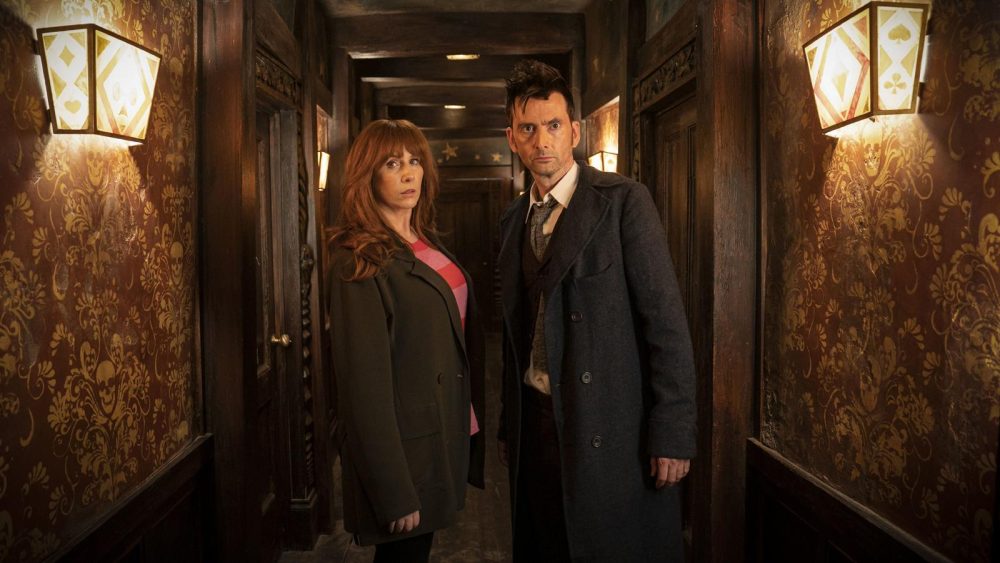
Harris plays the Toymaker wonderfully and takes a lot of delight in the role, bouncing back and forth from fun to terrifying with ease. You can tell he’s otherworldly and the way David Tennant reacts to recognizing the character just amps up the fear factor.
I did find it rather cool that Russel T. Davies, in writing this version of the Toymaker, takes the opportunity to comment on the character’s disregard for the culture and style of others— something present with the original iteration but only ever cosmetically. A white man wearing Chinese-inspired garb and calling himself Celestial, which, in the real world, plays into orientalism tropes, though the Toymaker adopts a German accent and looks for the 60th anniversary. Either way, the idea is clear: this is a creature who thinks he’s better, and to blend in, he appropriates the looks of others.
Harris and Tennant’s dynamite dynamic is highlighted when the Toymaker uses puppets to recap the show’s last few eras, post-Davies. It is interesting to watch the Doctor sit there and squirm, directly facing the failures of their previous incarnations, which saw tragedy befall many companions. Then, when the Doctor and Toymaker play a game together, the two come to blows in a way that can only be described as electrifying—two great actors really get to play well against one another.
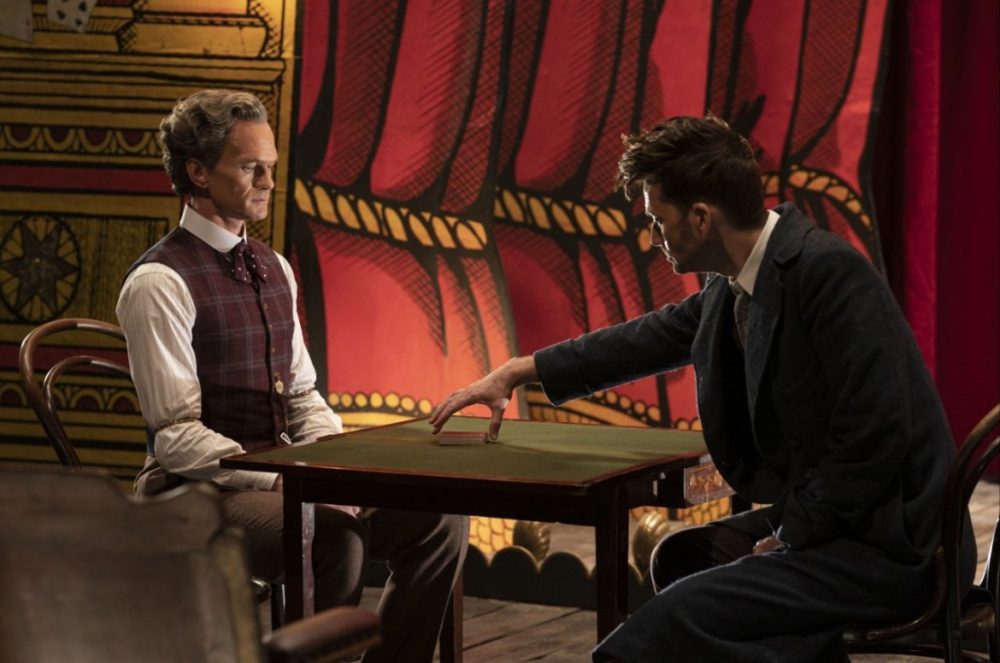
More class Doctor Who characters return
In the episode, UNIT (Unified Intelligence Taskforce) is back. This time, we visit their brand new headquarters, which looks an awful lot like a riff on Avengers Tower, and I dig it. From “The Star Beast” special, Ruth Madeley returns as Shirley Bingham, and Jemma Redgrave reprises her role as Kate Lethbridge-Stewart, the head of UNIT. Redgrave has been in the show for years, and I’m so glad she’s still around.
Finally, we get the big return of a classic era companion: Bonnie Langford is back in the role of Melanie Bush, or “Mel.” She was originally a companion to the sixth and seventh Doctors in the mid-80s. While she’s since reprised her role in the Big Finish audio adventures and a recent short where she played opposite the Seventh Doctor, Sylvestor McCoy, this is her first time stepping back onto the show since her original exit, and it’s so nice to see her.
I believe we will see Mel again after this; at least, I hope so because she has much more to offer as a UNIT agent. I’m still hoping for an official UNIT spin-off series; it’s more than earned the right to exist now.
These characters are fun and play off one another well, and it’s entertaining to see Donna, played by Catherine Tate, interact with many of these characters for the first time. And the way she uses the fight against the Toymaker to get an incredibly cushy job with UNIT is a chef’s kiss.
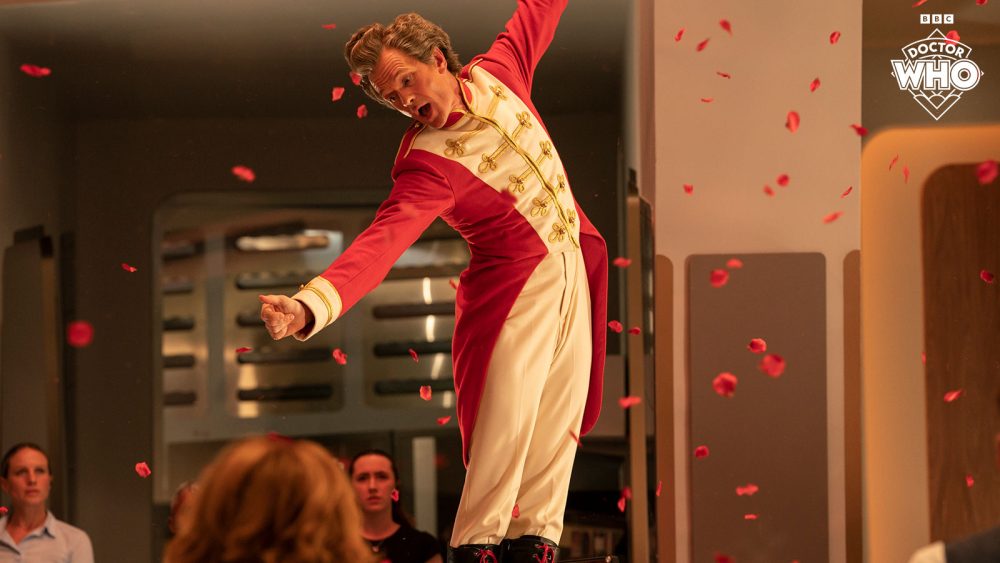
Side note: when the Toymaker dances to the Spice Girls‘ song “Spice Up Your Life,” it’s funny and shows how back we are with the Davies era. “The Giggle” isn’t special; that man loves putting pop songs into Doctor Who, and I thank him.
This all, of course, brings us to the big moment. As the third act ramps up, the Toymaker hits the Doctor with a laser beam, triggering a regeneration—this now makes the second time in a row the Doctor has been hit with a laser to create this result, and I think the third time overall. The first time was with Tennant as well. Instead of regenerating normally, however, the Doctor bi-regenerates, creating a second version of themselves while still continuing to exist in their previous form.
Ncuti Gatwa is introduced as the Doctor
Introducing Ncuti Gatwa as the Doctor! Tennant is still around; he’s still the Doctor, but now Gatwa is also here. Apparently, bi-regeneration was only ever considered a legend, so I sort of liken this happening to the first time Goku went Super Saiyan in Dragon Ball Z. It’s a brand new addition but written into the lore as something that can happen, but potentially never has before now. For me, it works; it felt wholly different, and seeing Gatwa and Tennant team up to stop the Toymaker was cool.
It’s revealed that Gatwa’s Doctor is in a much better place psychologically because Tennant’s Doctor stayed around and sought help, mending their body and mind after generations of continued non-stop trauma. I liked this, and it felt very healthy. It felt as if Davies allowed himself to heal from trauma and came out the other side, and now he’s sharing that with viewers. It’s fresh and new for Doctor Who and functionally works to soft reboot the character, allowing them to feel more free and open going forward.
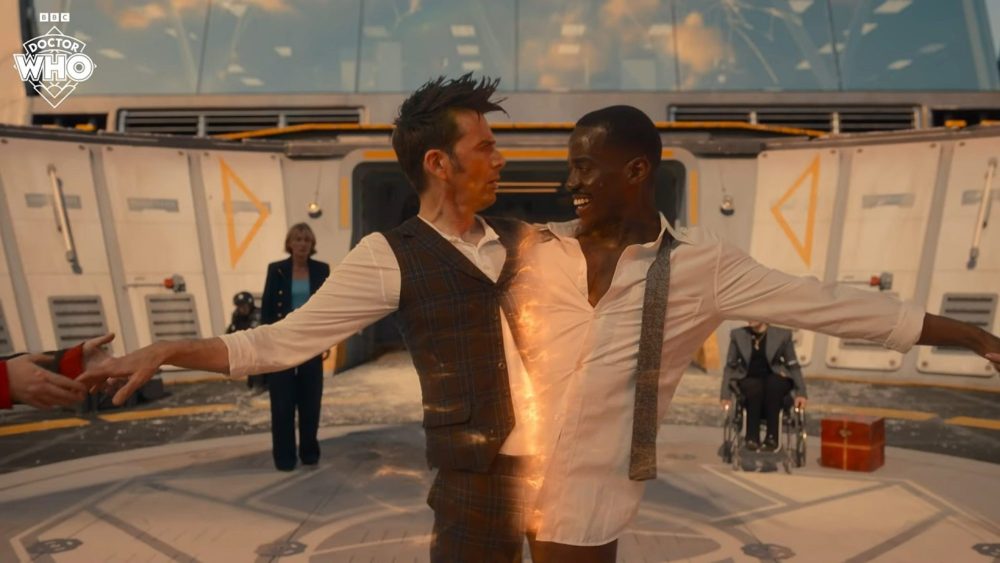
During one of the games, the Toymaker reveals the Master was locked away in a golden tooth. When that happened between the last appearance of Master three episodes prior and now, who knows? There’s a theory floating around that during Jodie Whittaker‘s era, the existence of Sacha Dhawan‘s Master had to do with the Toymaker. When the Master lost in “The Power of the Doctor,” they were sealed away. Ultimately, when the Toymaker is defeated, the tooth is left behind, and we see someone pick it up as the Master laughs. It’s something Davies has pulled before with the character, but it’s good to know they will one day return.
After saving the day, Gatwa’s Doctor reveals that the TARDIS is also bi-regenerated to a degree, and now both Tennant and Gatwa have functioning TARDISs to fly around in time and space. I think Davies is setting up for these two to meet again and bring the story of their shared existence to a grand conclusion, and for that, both need the ability to travel around. I’m okay with it and am excited to see where things lead. If the existence of two Doctors means Tennant’s branch will become the Curator, a version of the Doctor we last saw in the 50th-anniversary special, played by Tom Baker (originally the Fourth Doctor), that would be great.
As Gatwa leaves, Tennant’s Doctor settles down with Donna, her family, and Mel, allowing himself to exist in self-proclaimed retirement. He’s got a house, a family, and a niece in Yasmin Finney‘s Rose, and he’s already taking on clandestine adventures, which I think is a very funny uncle thing to do. I loved this story and the 60th-anniversary specials overall; I like that they take big swings and are trying something new; you can tell the language of these adventures is written by a very different man than the one who revived the show in 2005—one who’s grown a lot.
“The Giggle” reminds me how this new era is a fresh start in many ways, and as always, I’m optimistic about the future of Doctor Who.
Doctor Who (2023-) is now streaming on Disney+ in the US and globally. You can watch Classic Doctor Who in the U.S. on Britbox as well as Tubi TV. Revival-era Doctor Who (2005-2022) and its spinoffs, The Sarah Jane Adventures and Torchwood, are available on MAX. Other modern spinoffs such as CLASS can be bought on Prime Video, and K9 can be streamed on Tubi TV. All of the above, minus K9, are streaming in one place on BBC iPlayer in the UK.


